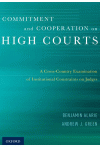
- Author(s): Benjamin Alarie, Andrew J. Green
- Publisher: Oxford University Press
- Edition: Ed 2017
- ISBN 13 9780199397594
- Approx. Pages 327 + Contents
- Format Hardbound
- Approx. Product Size 24 x 16 cms
- Delivery Time 3-5 working days (within Kerala & South India) (Others 7-9 days)
- Shipping Charge Extra (see Shopping Cart)
...................................................................................................................................................................................................................................
Description
Judicial decision-making is ideally impartial. In reality, judges are influenced by many different factors, including institutional context, ideological commitment, fellow justices on a panel, and personal preferences. Empirical literature in this area increasingly analyzes this complex collection of factors in isolation, when a larger sample size of comparative institutional contexts can help assess the impact of the procedures, norms, and rules on key institutional decisions, such as how appeals are decided. The book explains how the answers to the following institutional questions largely determine the influence of political preferences of individual judges, and the degree of cooperation among judges at a given point in time.
......................................................................................................................................................................................................................................
Contents
Acknowledgments
Introduction
1. Commitment and Cooperation on High Courts
Commitment: Judges and Their Personal
Cooperation: Judges and Their Colleagues
Combining Commitment and Cooperation
Are Commitment and Cooperation Related?
Why Commitment and Cooperation?
Comparing High Courts
United States
Australia
Canada
India
United Kingdom
Conclusion
2. How Do Judges Decide?
Theories of How Judges Decide
What Influences a Judges Decision?
Policy Preferences
Reputation
Identity
Financial/Material Compensation
Leisure
Institutional Wedges
Judges, the Law, and Institutions
3. Planting the Seed: Choosing High Court Judges
Choosing the Bench
Executive Power
"With the Advice and Consent": Combining the Executive and Legislature
The Committee Approach
Letting the Judges Decide
Is There a Connection between the Appointments Process and Decision-Making?
Do Political Processes Lead to Political Judges?
Are Judges Dispersed?
Are Judges Consistent Across Areas of Law?
Do Appointers Replicate Themselves?
Does a Balanced Process Lead to Cooperative Judge
Judging and the Appointment Process
4. Who Hears the Particular Appeal?
Choosing the Panel
No Discretion
High Discretion
Mixed Structures
Gaming or Efficiency? Rival Hypotheses of Panel Setting
Managerial Panel Selection
Does the Choice of Panels Influence Outcomes of Appeals?
Strategic Panel Selection
Setting Panels
5. Do Judges Care About Others?
Other Judges on the Panel
A Judges Role
Freshman Judge
The Chief Justice
Other Branches of Government
Judges and Other Actors
6. Slipping Through the Screen: How Do Courts Choose the Cases
They Hear?
Who Gets to Decide Which Cases to Hear?
How Do Judges Decide Which Cases to Hear?
Workload: How Will Accepting a Particular Case Affect a Judge's
Workload?
Cue Theory: What Kind of Case Is This?
Simple Ideology: Do I Want to Overturn This Decision?
Sophisticated Ideology Can I win?
Which Factors Matter?
7. The Influence of the Parties on Judges: Accuracy or Affiliation?
Who Is Before the Court?
Accuracy or Affiliation?
Accuracy
Affiliation
How Do Judges Relate to the Litigants?
Judges Are More Likely to Vote in Favor of the Litigant with the Greatest
Resources, Sometimes
Judges Do Not Clearly Tend to Vote in Line with Like-Minded
Litigants
How Do Judges Relate to Interveners?
Do Parties Make a Difference?
8. Norms, Leadership, and Consensus
Do Differences in Policy Preferences Influence Dissents?
Direct Measures of Ideological Difference
Does Complexity or Controversy Matter?
How Important Is Workload to Dissent?
Norms and the Chief Justice
Norms and Ideology
9. Conclusion
Appendices
1. The Data
2. Influences on Judges'Votes
3. Dissent Analysis
Index
...........................................................................................................................................................................................................................
Author Details
Benjamin Alarie is the Osler Chair in business Law at the University of Toronto's Faculty of Law. He is Past-President of the Canadian Law and Economics Association. He works primarily in taxation law and judicial decision-making and he has published in the American business Law Journal, The British Tax Review, the Canadian Business Law Journal, the Canadian Tax Journal, and many other academic journals. He is co-author of several editions of Canadian income Tax Law, Prior to joining the Faculty in 2004, Alarie Clerked for Madam Justice Louise Arbour at the Supreme Court of Canada.
Andrew J. Green is Associate Professor at the University of Toronto's Faculty of Law. His work focuses on environmental law, international trade (how international trade rules constrain countries' ability to implement environmental policy), administrative law, and the role of law in fostering individuals environmental Law Review, the Virginia Environmental Law Review, the Supreme Court Law Review, and the Osgoode Hall Law Journal, among others.
...........................................................................................................................................................................................................................
